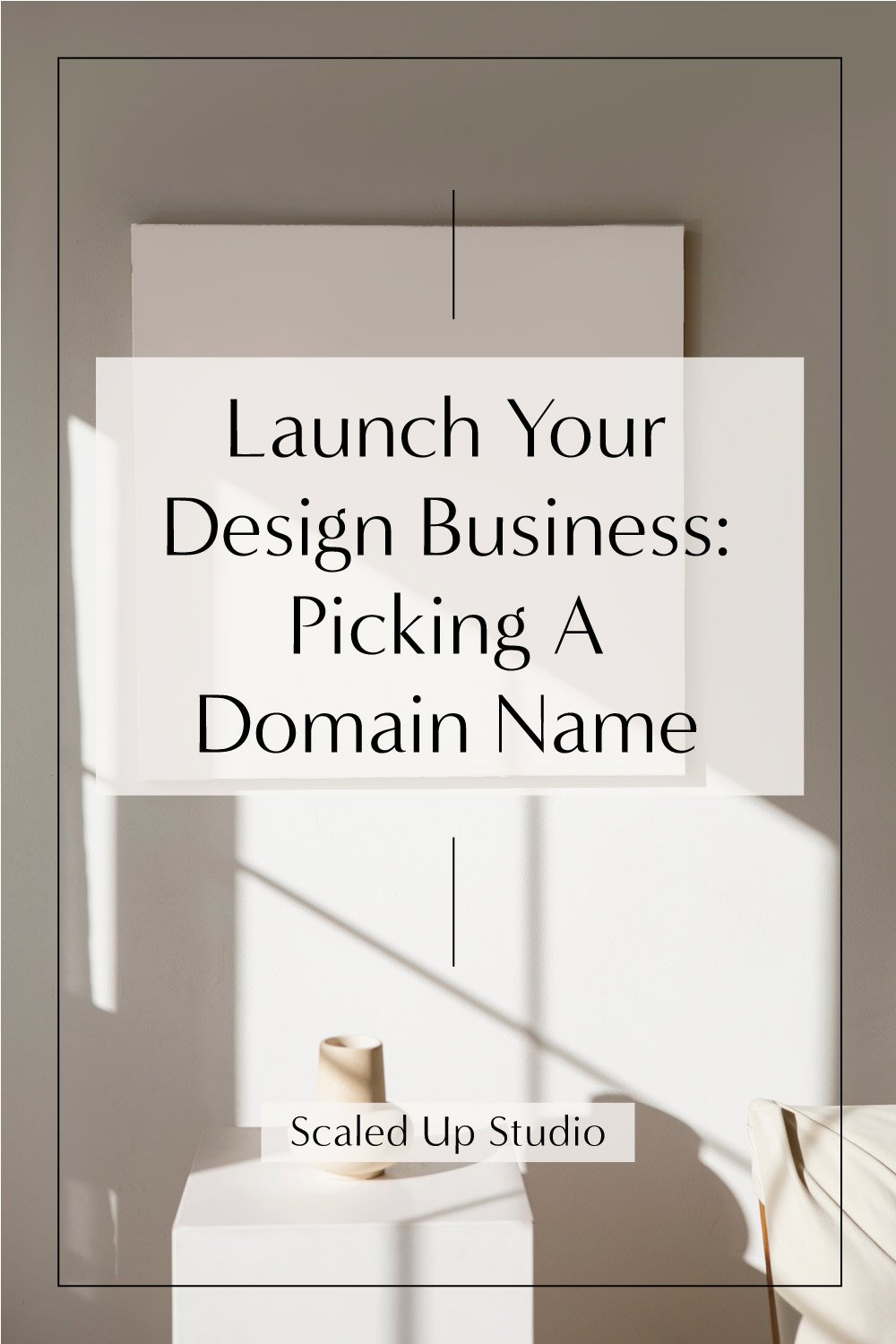Picking An Interior Decorating Business Domain Name
[This post contains affiliate links. Click here to read my full disclosure.]
Picking a domain name for your interior design business is an important decision. Congrats! This means you’ve decided to start a new creative business!
Maybe you’ve decided to get going on that home decorating blog you’ve been considering for years.
Maybe you want to turn your interior design obsession into a side business or full-fledged career change.
Maybe you’re sick of your current work situation and starting your own design business offers way more flexibility and work you love.
Whatever your motivations, now you need to brand your interior design business, and after choosing a solid business name, it’s time to focus on the domain name for your website. It’s an important decision with ramifications beyond just the name itself.
So in this post, we will focus on making an informed decision for your interior design business domain name.
Here’s what we’ll cover:
Post #6 - DIY Your Interior Design Website Series
How To Start An Interior Design Business
Why You Should Build Your Interior Design Website
Why Squarespace Beats WordPress For Interior Design Websites
Best Interior Design Websites On Squarespace
Best Squarespace Template For Interior Design
Choosing An Interior Design Domain Name
8 Interior Design Website Must-Haves
Interior Design Website Mistakes To Avoid
Why Blogging Is Important for Interior Designers
9 Tips For Writing An Interior Design Blog Post
Interior Design Business Domain Name Tips
Here are three general pointers for choosing an interior design domain name:
It must be easy to remember
It must be easy to spell
It must be easy to relay to someone else
To Dot Com Or Not To Dot Com, That Is The Question
We’ve always been told we must have a .com domain name. The problem is, most of the desirable .com domains have been taken. The fact of the matter is, .com extensions are only getting more scarce, so the idea that it has to be .com is kind of dated and often simply not possible.
What to do? Don’t panic. We do want to try to get a .com extension, but if that’s not working, here are some options:
Extensions like .co or .net can also work. I prefer .co - many perceive it as standing for “company.” It’s become a popular runner-up choice behind .com with many start-ups opting for it when they can’t secure .com. My home and garden blog is greenhousestudio.co and it’s worked well.
A possible option for a design business is .studio, although I’d vote for .co if possible.
Avoid .biz - it’s often perceived as spammy.
Although people are usually clicking through to your website or email, definitely consider having to spell your domain or email over the phone. You may find people will default to to .com, and it can get entered incorrectly sometimes.
If you’re working 1:1 with clients or vendors in a service-based interior design business so you’re on the phone a lot, this can get tedious fast.
How important is a .com domain name?
Some digital marketers make it sound like .com is the end-all-be-all and it’s simply not. Specifically, it’s been stated that the .com extension will always outrank the same name as a .co in terms of SEO (search engine optimization).
This may be true on it’s own, in a vacuum, but the quality of your content and work in general is a MUCH more important factor for SEO and anything else relating to your business, than the extension of your domain.
I have several blog posts that rank on Google page 1 with my interior and landscape design blog, greenhousestudio.co. Some of which ranked within a few weeks of posting on a blog less than 6 months old.
So let’s maintain some perspective on the whole .com thing.
Start looking at the domain extensions of brands around you, both in your specific niche and not. Some don’t have a .com and it clearly wasn’t the end of the world. Not by a long shot. Again, .coms are only getting more scarce, so often we just need to move on to other viable alternatives.
New to Squarespace? You can sign up for a free trial, and I can even get you a discount! Use code GREENHOUSE10 to save 10% off your first year.
Domain Name Length
Try to keep your domain to a maximum of 16 characters. My domain, scaledupstudio.com has 14 characters. I’m rather proud of that since it took quite a bit of brainstorming, list-making, and mental stewing to arrive at a name that works length-wise, is a .com, and of course, works as an overall name.
Greenhousestudiodesign is a .com extension. And a mouthful, but at least it’s easy/logical to spell. So it’s imperfect. For example, a logical shorter domain could be gsdesign.com, but it’s long gone. (It’s for sale to the tune of 10k - as if!)
Frankly I don’t know if it would be better to have a shorter domain or the longer one that spells it out. Google does look at keywords in domains, so is my brand a bit more searchable by having the entire name spelled out? I don’t know, but I do know it’s not a make-or-break either way.
In my business, I’m really trying to fight perfectionism and just make the best decision at the time and move on, and this is a good example. (I’d be lying though if I said I didn’t obsess over this at the time!)
Again, choosing a domain name often involves compromise. I chose to go with a longer but logical domain with a .com extension based on what was available with .com and .co. Trust me, I’ve had domains that were shorter but more difficult to relay - it’s confusing.
For example, I had a domain “missionda.com” that stood for Mission Design Associates. It was way too confusing when people would try to read my domain or email - they didn’t know what to do with the “da” part, especially because it ends with a vowel.
Do Your Own Domain Name Research
Check out your domain ideas on Squarespace's domain search. There are any number of domain searchers, but I always use Squarespace’s just because it’s stylish! (It’s Squarespace after all.)
If you don’t have a business name or domain nailed down (like using your own first and last name as your brand and domain) try out several names and see what feels right.
I’d advise letting your options sit for a couple days and then revisit them. Just like writing, you often need some time/distance before you can see what really works or not.
Domain Hosting v. Web Hosting
That brings us to the subject of domain hosting. First, I want to clarify a confusing point: domain hosting vs. web hosting. They are two different services. Yes I know, I wasn’t at all clear on this either.
Your domain host provides your domain name.
A domain name is like a street address that directs people to your website's location, but it's not the content that visitors see when they visit your site. You can register and host your domain with Squarespace if you choose to or you can host your domain elsewhere.
Your web host provides the space where you display your website's content.
Squarespace provides both the tools for creating and managing your content, and a place on the internet to display your content. Every Squarespace site is stored on their servers.
[Side note - many Wordpressers recommend BlueHost because it’s very cheap and they are affiliates, but I’ve heard nothing but problems from bloggers who start out with it. They end up having to switch hosts once their blog gets going and has real traffic, which is a real hassle, so beware.]
Squarespace makes it super easy to do everything under one roof - both domain and web hosting. But a while back, the question came up about whether this is a good idea or not.
A well respected Squarespace instructor mentioned she hosts her domains elsewhere, specifically with DreamHost , to provide a degree of separation.
So while all of my other domains are with Squarespace, I decided to register and host this site’s domain with DreamHost . You may also find it’s slightly cheaper than Squarespace domain hosting.
However, just to entice you back in the other direction, all Squarespace accounts with annual billing terms include one free custom domain for a year. To learn more, visit Free Squarespace domain offer .
If you do decide to host your domain elsewhere, you will then need to connect your domain to Squarespace through a process called domain mapping. After completing these steps, your domain will stay registered with the host that you purchased the domain from, but it will connect to your Squarespace site.
Domain mapping isn’t hard to set up - it’s mostly copy/pasting, and Squarespace has specific instructions on connecting from the major domain hosts. Read about domain mapping here domain mapping here.
So that’s it! You have your domain name chosen and set up, and now you’re ready for the next step in creating your beautiful new business website! If you have any questions about any of this, leave me a comment below.
Other business-building posts:
Don’t forget to Pin it for later!
If you have any questions or comments, please drop me a note below. Be sure to check back for my response (I always respond) since no notification is sent.





